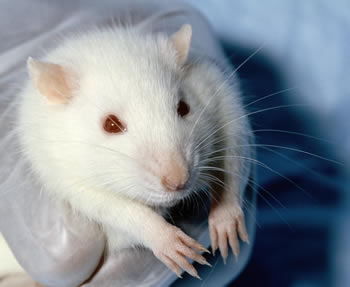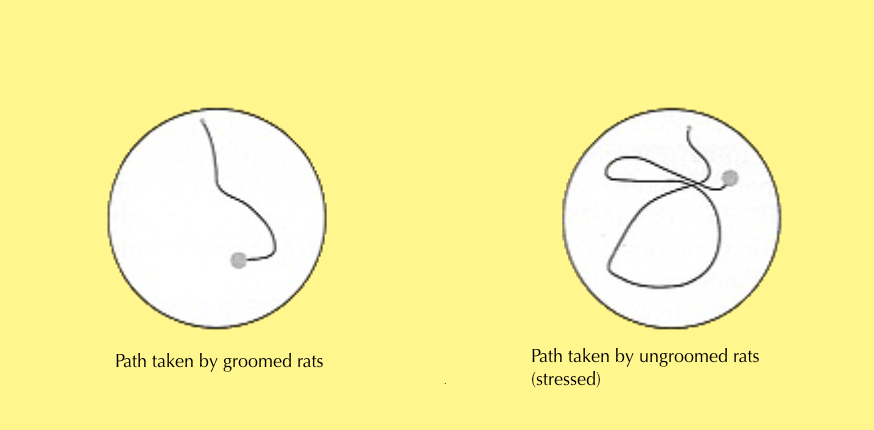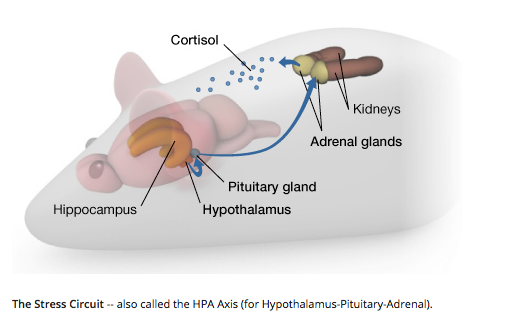Meaney et al (1988)
 Meaney carried out a study of the role of stress hormones on memory. More importantly, this study shows that the mother's touch or grooming of her offspring, actually leads to gene expression which helps in the regulation of stress. Those rats that are groomed, regulate stress better. This leads to lower levels of life time cortisol levels which means that they have less memory impairment latter in life.
Meaney carried out a study of the role of stress hormones on memory. More importantly, this study shows that the mother's touch or grooming of her offspring, actually leads to gene expression which helps in the regulation of stress. Those rats that are groomed, regulate stress better. This leads to lower levels of life time cortisol levels which means that they have less memory impairment latter in life.
This is a good example of an animal model used to study the effects of stress on humans. This is done not only because of the genetic similarities between mice and humans, but also because the shorter lifespan of rats makes this study possible.
The abstract of the original study is available here.
To begin, watch this short version of his study.
The aim of the study was to determine the effect of glucocorticoids (stress hormones) on memory.
Meaney and his team used an independent samples design. The rats were randomly allocated to one of two conditions.
Treatment group: Newborn rats were handled daily by the researchers for three weeks - from the day of their birth until the day of weaning. During this time they were taken away from their mothers for 15 minutes and placed in a plastic container lined with a paper towel. They were then brushed for an intense 15 minutes to simulate the grooming of the mother rat.
The rats in the control group were taken away from their mother but there was no handling by the researchers. This group served as the control condition.
To test the effect of these elevated rates of stress hormones over their lifetime, two-year-old rats were put into a pool of milky water. In the pool was a platform. Meaney and his team tracked the route of the rats as they sought out the platform based on the rats' memories of previous attempts to escape the water.
The researchers found that high levels of glucocorticoids - stress hormones - in the early life of a rat resulted in changes that affected the rats in old age. Increased exposure to adrenal glucocorticoids accelerated hippocampal neuron loss and cognitive impairments in ageing.
You can see that the rats taken away from their mothers at a young age and were not groomed by the researchers took a much more circuitous route to get to the platform when they reached old age.

Hippocampal cell loss and pronounced spatial memory deficits emerged with age in the neglected rats but were almost absent in the rats groomed by the researchers. So, what has happened?
It appears that the extra stroking that the rats received led to an activation of genes that are responsible for the reaction to the stress response. This is an example of epigenetics - the grooming process “turns on” the genes which help the young rat cope with stress - which then leads to a longer and healthier life.
Here is an image of the rat's stress circuit. When the rat is stressed, stress signals travel from the hypothalamus to the pituitary gland and then to the adrenal glands. The adrenal glands then release the hormone cortisol. Cortisol is released from the adrenal glands and travels to hippocampus, where it binds to glucocorticoid receptor sites. When cells in the hippocampus detect cortisol, which binds to the receptor sites, a message is sent to the hypothalamus that shuts down the Fight of Flight response.

Long term exposure to cortisol causes neurons to admit more calcium through channels in their membrane. This leads to over-stimulation which then leads to hippocampal cell death. This is a problem when it comes to our ability to create memory as the hippocampus is the location of acetylcholine receptor sites. Loss of hippocampal cells correlates with lower levels of acetylcholine. Research shows that there is a correlation between high levels of glucocorticoids, low levels of acetylcholine, and Alzheimer's.
- It is questionable to what extent we can generalize the findings from rats to human beings. However, there is research that demonstrates lower levels of acetylcholine and higher levels of glucocorticoids in Alzheimer's patients.
- When Meany did his research he did not yet understand the role of epigenetics in explaining the results.
- The study was artificial - lacking ecological validity.
- This research led to new theories of the role of stress on cognitive functioning. Research by Carion has found hippocampal atrophy in abused children; research has also found lower hippocampal volume in veterans with PTSD.
- In order to measure hippocampal volume in rats, the animals had to be killed. There are ethical concerns about the killing of animals in research
Getting to know the psychologist
Thank you to Kasia Siemieniuk for sharing this great video on the work of Michael Meany!

 IB Docs (2) Team
IB Docs (2) Team
